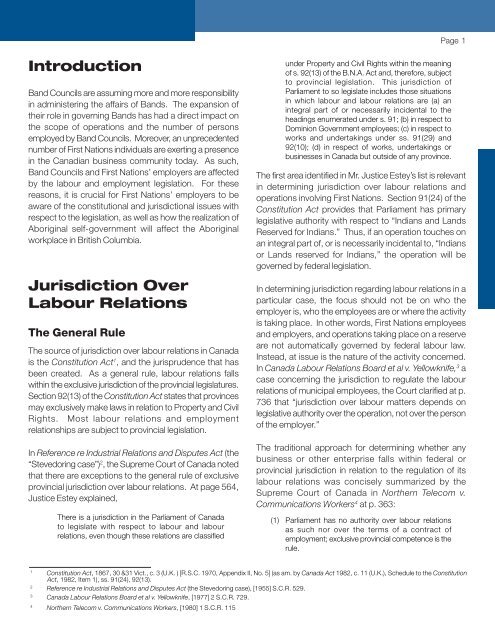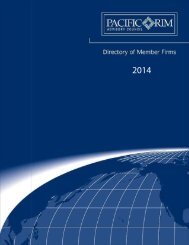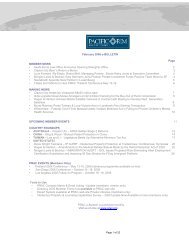Jurisdictional Issues In The Aboriginal Workplace
Jurisdictional Issues In The Aboriginal Workplace
Jurisdictional Issues In The Aboriginal Workplace
Create successful ePaper yourself
Turn your PDF publications into a flip-book with our unique Google optimized e-Paper software.
<strong>In</strong>troduction<br />
Band Councils are assuming more and more responsibility<br />
in administering the affairs of Bands. <strong>The</strong> expansion of<br />
their role in governing Bands has had a direct impact on<br />
the scope of operations and the number of persons<br />
employed by Band Councils. Moreover, an unprecedented<br />
number of First Nations individuals are exerting a presence<br />
in the Canadian business community today. As such,<br />
Band Councils and First Nations’ employers are affected<br />
by the labour and employment legislation. For these<br />
reasons, it is crucial for First Nations’ employers to be<br />
aware of the constitutional and jurisdictional issues with<br />
respect to the legislation, as well as how the realization of<br />
<strong>Aboriginal</strong> self-government will affect the <strong>Aboriginal</strong><br />
workplace in British Columbia.<br />
Jurisdiction Over<br />
Labour Relations<br />
<strong>The</strong> General Rule<br />
<strong>The</strong> source of jurisdiction over labour relations in Canada<br />
is the Constitution Act 1 , and the jurisprudence that has<br />
been created. As a general rule, labour relations falls<br />
within the exclusive jurisdiction of the provincial legislatures.<br />
Section 92(13) of the Constitution Act states that provinces<br />
may exclusively make laws in relation to Property and Civil<br />
Rights. Most labour relations and employment<br />
relationships are subject to provincial legislation.<br />
<strong>In</strong> Reference re <strong>In</strong>dustrial Relations and Disputes Act (the<br />
“Stevedoring case”) 2 , the Supreme Court of Canada noted<br />
that there are exceptions to the general rule of exclusive<br />
provincial jurisdiction over labour relations. At page 564,<br />
Justice Estey explained,<br />
<strong>The</strong>re is a jurisdiction in the Parliament of Canada<br />
to legislate with respect to labour and labour<br />
relations, even though these relations are classified<br />
under Property and Civil Rights within the meaning<br />
of s. 92(13) of the B.N.A. Act and, therefore, subject<br />
to provincial legislation. This jurisdiction of<br />
Parliament to so legislate includes those situations<br />
in which labour and labour relations are (a) an<br />
integral part of or necessarily incidental to the<br />
headings enumerated under s. 91; (b) in respect to<br />
Dominion Government employees; (c) in respect to<br />
works and undertakings under ss. 91(29) and<br />
92(10); (d) in respect of works, undertakings or<br />
businesses in Canada but outside of any province.<br />
Page 1<br />
<strong>The</strong> first area identified in Mr. Justice Estey’s list is relevant<br />
in determining jurisdiction over labour relations and<br />
operations involving First Nations. Section 91(24) of the<br />
Constitution Act provides that Parliament has primary<br />
legislative authority with respect to “<strong>In</strong>dians and Lands<br />
Reserved for <strong>In</strong>dians.” Thus, if an operation touches on<br />
an integral part of, or is necessarily incidental to, “<strong>In</strong>dians<br />
or Lands reserved for <strong>In</strong>dians,” the operation will be<br />
governed by federal legislation.<br />
<strong>In</strong> determining jurisdiction regarding labour relations in a<br />
particular case, the focus should not be on who the<br />
employer is, who the employees are or where the activity<br />
is taking place. <strong>In</strong> other words, First Nations employees<br />
and employers, and operations taking place on a reserve<br />
are not automatically governed by federal labour law.<br />
<strong>In</strong>stead, at issue is the nature of the activity concerned.<br />
<strong>In</strong> Canada Labour Relations Board et al v. Yellowknife, 3 a<br />
case concerning the jurisdiction to regulate the labour<br />
relations of municipal employees, the Court clarified at p.<br />
736 that “jurisdiction over labour matters depends on<br />
legislative authority over the operation, not over the person<br />
of the employer.”<br />
<strong>The</strong> traditional approach for determining whether any<br />
business or other enterprise falls within federal or<br />
provincial jurisdiction in relation to the regulation of its<br />
labour relations was concisely summarized by the<br />
Supreme Court of Canada in Northern Telecom v.<br />
Communications Workers 4 at p. 363:<br />
(1) Parliament has no authority over labour relations<br />
as such nor over the terms of a contract of<br />
employment; exclusive provincial competence is the<br />
rule.<br />
1 Constitution Act, 1867, 30 &31 Vict., c. 3 (U.K. ) [R.S.C. 1970, Appendix II, No. 5] (as am. by Canada Act 1982, c. 11 (U.K.), Schedule to the Constitution<br />
Act, 1982, Item 1), ss. 91(24), 92(13).<br />
2 Reference re <strong>In</strong>dustrial Relations and Disputes Act (the Stevedoring case), [1955] S.C.R. 529.<br />
3 Canada Labour Relations Board et al v. Yellowknife, [1977] 2 S.C.R. 729.<br />
4 Northern Telecom v. Communications Workers, [1980] 1 S.C.R. 115






